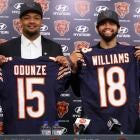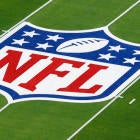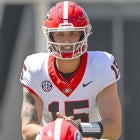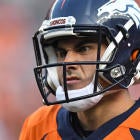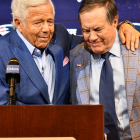Maybe the idea of Philip Rivers being traded from the Chargers to the Titans isn't a real thing. OK, the idea is real. We're talking about it. Whether or not a trade is actually being discussed by the two teams -- much less consummated -- is an entirely different animal.
We've already talked about where a trade would likely happen (and Tennessee's emerged as the primary suitor) and we know when it would happen. But what what would be traded is still a different story.
It's still worth looking at what the cost of doing business for the two teams involved might be here, so we can have a better idea as to immediately passing judgment on the deal when it actually happens.
We know one thing that would occur with this transaction: Rivers.
In Rivers, the Titans would be receiving a quarterback who turned 33 in December. Over the past five years, Rivers averaged -- including a 2012 year where most observers wrote him off before he won Comeback POY in 2013 -- 4,341 yards per season. Over that span, Rivers completed 65.8 percent of his passes, threw 146 touchdowns (29 per year) and 77 interceptions (15 per season) while averaging 7.9 yards per attempt.
He's been one of the best quarterbacks in the NFL over the past five years. So the Titans are getting a franchise quarterback who likes the geographical area (it's close to his Decatur, Alabama home), knows the coach (Ken Whisenhunt was his OC during the bounceback 2013) and who has carried bad rosters to the postseason before.
Put Rivers on an open, unencumbered market and he's worth multiple first-round picks and/or $100 million, easy. That's not the case here, though. If Rivers decides he really doesn't want to play in Los Angeles and the Chargers move, there's not a ton he can do about it. The Chargers can place the franchise tag on Rivers and hold him through 2016 and potentially 2017 if they want.
It's possible Rivers would be stubborn enough to shrug his shoulders and leave the game to coach high-school football rather than play in L.A. He's got that kind of streak in him. Tagging Rivers would also mean dealing with an unhappy quarterback and eventually getting nothing in return for his services once he was able to leave.
What Titans Would Pay
In exchange for a franchise, league-altering quarterback, the Titans will have to give up plenty.
The most obvious thing is the No. 2 overall pick. The Chargers, presumably, would use that to select Marcus Mariota, resetting the franchise with a young, highly-drafted quarterback who would fit the culture perfectly. Mariota is a west-coast guy, born in Honolulu and spending his time in Oregon shredding through defenses in the Ducks' high-octane offense.
In three years at Oregon, Mariota completed 66.8 percent of his passes, averaged 3,598 yards per season, threw 105 touchdowns and only 14 interceptions. He also averaged 9.3 yards per attempt, including 10 YPA his senior year.
He's a cerebral quarterback with all the physical tools to succeed at the next level.
Because the Chargers are getting that kind of player and because the Titans will be paying Rivers $100 million (roughly five times what Mariota will receive from San Diego), we won't send back much in this deal.
The No. 2 overall pick from Tennessee and the Titans 3rd-round pick in 2015 should do just fine. That's a really good pick, No. 66 overall.
What the Chargers Would Pay
This is where things get really interesting. Kevin Acee, who covers the Chargers for the San Diego Union-Tribune and is as close to the situation as anyone out there, wrote the team needs to trade Rivers. He also wrote the Bolts will "in all likelihood would keep their first-round pick should they deal Rivers to Tennessee."
That seems ... improbable. But the Chargers have most of the leverage here. If they don't want to move Rivers, they don't have to move Rivers.
Tennessee might recognize the pressure San Diego is feeling with its quarterback, but team control is team control and San Diego could ride out the Rivers situation for two or three years, potentially not move to Los Angeles and then decide how to move forward.
In other words, this is probably a one-shot deal for Wisenhunt if he wants to land Rivers. The Titans won't have the ammo to make this move going forward, unless they draft Mariota for the express purpose of trading him. That's a dangerous game of chicken.
So the Titans are willing to sacrifice the first-round pick but with a first- and third-rounder going back to San Diego they also require the Chargers second-round pick.
Tom Telesco doesn't love it, but you go from two picks in the top 48 to two picks in the top 17, three picks in the top 66 and four picks in the top 83 of the draft. Be right on Mariota, hit on the other three picks and you're rebooting the franchise quickly.
So Who Wins?
Everyone, really.
To recap:
Tennessee sends a first-round pick (No. 2 overall) and a third-round pick (No. 66 overall)
San Diego sends Philip Rivers and a second-round pick (No. 48 overall)
There's honestly no way to effectively judge how this deal works out. The precedence just isn't there. Joe Montana (plus safety David Whitmore and a third-round pick in 1994) was sent by the 49ers to the Chiefs for a first-round pick, the 18th-overall pick, in 1994.
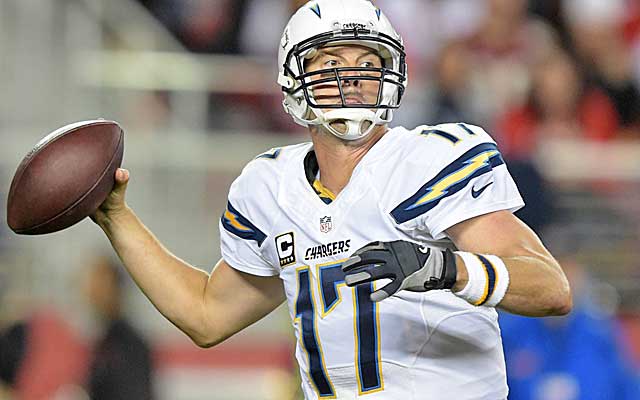
He was 36 at the time, though, and we didn't see quarterbacks age the way they do these days. Montana had two years left; Rivers probably has a minimum of five if someone can freaking protect him already (he's averaged 37 sacks the last five years).
The Titans have invested in the line. Taylor Lewan, Chance Warmack, Brian Schwenke and Andy Levitre form a nice protection core. Kendall Wright and Justin Hunter are viable weapons. Rivers would go to a bad team, but he'd be a winner in that he could effectively turn around this team quickly, be happy about where he's living and chase a Super Bowl out of a bad division with an old friend as his head coach.
Tennessee wins for basically the same reasons. It acquires a franchise quarterback with the No. 2 overall pick, can sell this sort of move to a largely lethargic fanbase and would become a viable candidate to unseat the Colts in the AFC South as soon as 2015.
Marcus Mariota wins by landing with a smart, forward-thinking organization in a perfect place for his talents.
The Chargers win by rebooting things completely and still managing to find the pieces necessary to turn the franchise back around. There's lots to love about the defense in San Diego in so far as young pieces go. Grab Todd Gurley or Melvin Gordon at No. 17 and suddenly between the back, Mariota and Keenan Allen you have the makings of an outstanding young offensive core.
It doesn't matter if the deal who's creating the impetus for the deal happening, it's a logical deal that provides both teams viable alternatives for going down a quarterback path they don't prefer.













